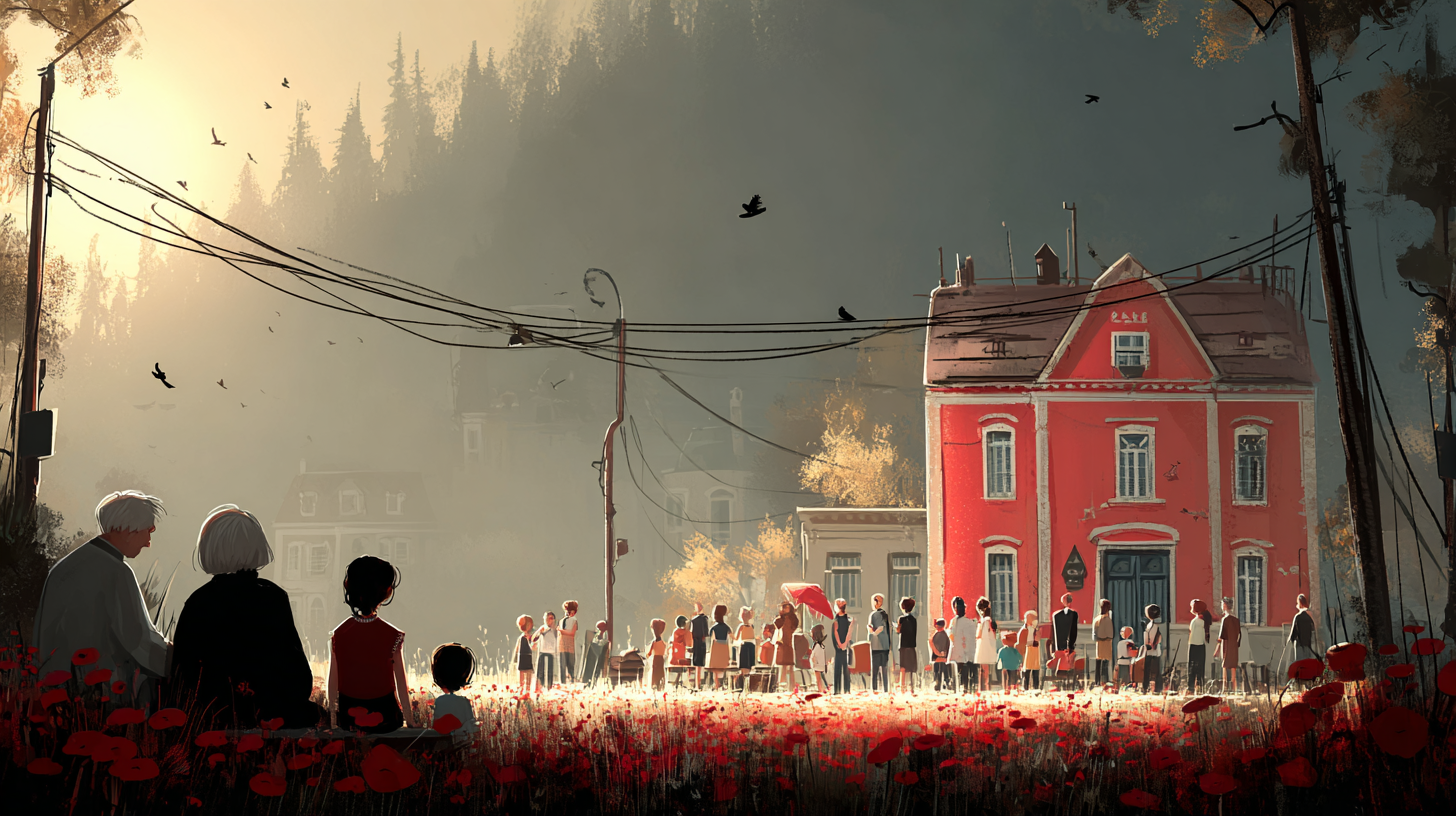The number of people or animals living in a place.
ある場所に住んでいる人や動物の数
以下は英単語 “population” に関するストーリー型学習コンテンツです。まずは大枠の意味を理解して最後の文章で確認しましょう。
主な意味(main meaning)
| 品詞 | 発音記号 | 意味 | 例文 |
|---|---|---|---|
| 名詞 (noun) | /ˌpɒpjʊˈleɪʃən/ | 住んでいる人や動物の数 | The population of the city is growing every year. |
語源(etymology)
「population」はラテン語の populus(人々)に由来し、そこから「人々が集まった全体」という意味になりました。核のイメージは「集まり」「人々の数」です。
類義語(synonyms)
| 類義語 | 例文 |
|---|---|
| inhabitants | The inhabitants of the island are friendly. |
| residents | Many residents joined the town meeting. |
| citizens | Citizens are responsible for voting in elections. |
| community | The community worked together to clean the park. |
反義語(antonyms)
| 反義語 | 例文 |
|---|---|
| emptiness | After the war, the village was left in emptiness. |
| desertion | The desertion of the town happened after the factory closed. |
コロケーション(collocations)
| コロケーション | 例文 |
|---|---|
| population growth | Population growth causes many environmental problems. |
| aging population | An aging population is a challenge for the health system. |
| population density | The population density in Tokyo is very high. |
| rural population | The rural population is decreasing every year. |
2項表現(binomials)
| 2項表現 | 例文 |
|---|---|
| men and women | The population includes both men and women. |
| young and old | The concert was enjoyed by young and old. |
英語ストーリー(english story)
Story: A Town’s Changing Population
Mr. Brown worked as a teacher in a small town. Over the years, he noticed that the population of the town was slowly changing. When he first arrived twenty years ago, the town was full of young and old people, and there were many families with children. But now, things were different.
One morning, Mr. Brown was talking to his colleague, Ms. White, in the teacher’s room.
“The population is decreasing,” he said. “Many young people have moved to the city.”
Ms. White nodded. “Yes, the residents who remain are mostly elderly. We have an aging population, and it affects our school too. There are fewer students each year.”
Later that day, Mr. Brown met some citizens at the town meeting. They discussed important issues such as population growth in the nearby city and the decline in their own town. One woman said, “The community must think of new ideas to bring more families here.”
Another man added, “The rural population is shrinking everywhere, not only in our town. Jobs are in the city, so people leave.”
Mr. Brown listened carefully. He understood that population density was much higher in the city, while the countryside faced emptiness and sometimes even desertion. It was a serious problem.
On his way home, Mr. Brown thought about the situation. He remembered the words of an old friend: “Every inhabitant is important. A town is more than just numbers; it is about people working together.”
That evening, he wrote an article for the local newspaper. He explained how the town’s community could help. He suggested creating new activities for both men and women, supporting small businesses, and building spaces where young and old could meet.
He ended his article with these words: “The population may change, but if we work together, our town will always have a heart.”
和訳
ストーリー:町の変わる人口
ブラウン先生は小さな町で教師をしていました。年月がたつにつれて、その町の**population(人口)が少しずつ変化していることに気づきました。20年前に来たときは、町にはyoung and old(若者もお年寄りも)**がいて、子どものいる家族もたくさんありました。しかし今は違っていました。
ある朝、ブラウン先生は職員室で同僚のホワイト先生と話しました。
「**population(人口)**が減っていますね。多くの若者が都会に引っ越しました。」
ホワイト先生もうなずきました。
「そうです。残っている**residents(住民)のほとんどは高齢者です。私たちはaging population(高齢化する人口)**を抱えていて、それは学校にも影響します。毎年、生徒が減っています。」
その日の午後、ブラウン先生は町の会議で何人かの**citizens(市民)に会いました。彼らは都会でのpopulation growth(人口増加)**や、自分たちの町の減少について話し合いました。
ある女性が言いました。
「この**community(地域社会)**はもっと家族を呼び込む新しいアイデアを考えなければなりません。」
別の男性が言いました。
「**rural population(地方の人口)**はどこでも減っています。町だけじゃないんです。仕事が都会にあるので、人々は出ていくのです。」
ブラウン先生は注意深く耳を傾けました。都会の**population density(人口密度)はとても高いのに、田舎はemptiness(空っぽ)や時にはdesertion(無人化)**に直面していることを理解しました。これは深刻な問題でした。
帰り道、彼は状況について考えました。友人の言葉を思い出しました。
「すべての**inhabitant(住人)**が大切だ。町は単なる数字ではなく、人々が一緒に働くことなのだ。」
その夜、彼は地元新聞に記事を書きました。町の**community(地域社会)**ができることを説明しました。男女(men and women)を問わず新しい活動を作り、小さな商店を支え、**young and old(若者もお年寄りも)**が集まれる場所を作ることを提案しました。
そして最後にこう書きました。
「**population(人口)**は変わるかもしれない。しかし私たちが協力すれば、町にはいつも心があるのです。」
Q&A
Q: population と inhabitants の違いは?
A: populationは「人口全体」という数を表します。inhabitantsは「そこに住んでいる人々」という中身(人そのもの)を指します。
Q: population と residents の違いは?
A: residentsは「そこに正式に住んでいる人々」で、住民票のある人などをイメージします。populationはもっと大きな視点で、「地域全体の人数」を表します。
Q: population と citizens の違いは?
A: citizensは「市民・国民」で、法律上の権利や責任を持つ人を意味します。populationは「数」としての人口で、法律的な立場は含みません。
Q: population と community の違いは?
A: communityは「つながりのある集団」で、単なる数ではなく人々の関係性を強調します。populationは「数の集まり」を表します。
Q: population growth と aging population の違いは?
A: population growthは「人口が増えること」、aging populationは「人口の中で高齢者の割合が増えていること」です。方向性が違います。
Q: population density と rural population の違いは?
A: population densityは「人口密度」で、ある場所にどのくらい人が詰まっているかを表します。rural populationは「地方に住む人々」で、地理的な場所を表します。
Q: emptiness と desertion の違いは?
A: emptinessは「空っぽの状態」で、人がいないことを淡々と表します。desertionは「人々が去った結果の無人状態」で、捨てられた・見放されたというニュアンスを持ちます。



コメント